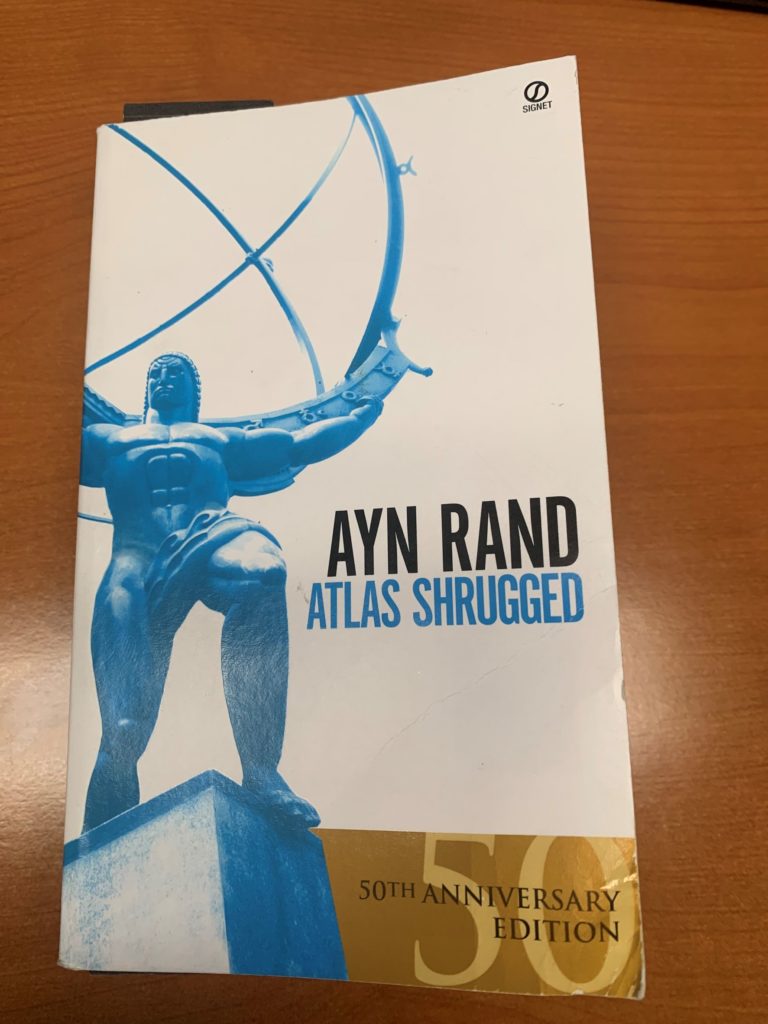This is one of those chapter’s that I struggled with a bit. I struggled to make time to read and I struggled to pull something out meaningful. The subject matter was a little dull as well. But, I think that there was something to pay the fuel bills here.
When I was a child, grade school to middle school, my uncle bought a fishing boat. With that boat was also a commercial fishing license. At that time, salmon fishing lasted two weeks. We would go out at least once while he fished for money, we fished for sport. A day was measured by whether your catch met your expenses or not. A good day exceeded your expenses (hopefully significantly).

So, Jim Taggart is marrying the dime store girl. Not much is written about him or the relationship in between the time that they met and actually getting married. The book feels like it has been about a year but the truth is that very little is spoken about time. It seems like it is always fall whenever the weather is mentioned but there is very little actually marking time.
Because Jim has really evolved into an insignificant character in the book, this wedding has to have a higher purpose. After all, there is over forty pages about it. Wouldn’t you know who shows up? Francisco d’Anconia of course and he ends up with a hard hitting soliloquy.
As is customary, the minor characters behave as snooty, intolerable children. They talk in empty platitudes. You know the kind where people say something rude out load without addressing a person specifically or making eye contact. “Money is the root of all evil” within earshot of Francisco. That set him off into some real insightful analysis.
I have heard it said that money is a measure of work or better yet energy. The reason money works is that I don’t necessarily want a bushel of apples for my beef every time. Money equalizes the peaks and valleys that bartering cannot. And, not all work is as equally valuable. While you may not want to throw hay on a trailer all day, there are plenty more people that can actually do that job than fix your automobile. Hence those jobs command different rates.
I am going to kind of go back and forth between the book and reality here. Francisco sets off to dispel the myth that money is the root of all evil. I tend to agree with him that people with money are the ones that subconsciously understand the value proposition of job rates being unequal. However, the balance of power is changing to people that are gaining money by changing the laws. He calls them ‘takers’.
We do not have to look far to see this in our own lives. This was the first article I looked up on congress people’s net worth changing while in office. I am willing to concede that there are no poor people running for congress but I think that it is pretty apparent that there are a lot of people somehow increasing wealth while in office.
“Money is the barometer of societies virtue. When you see that trading is done, not by consent, but by compulsion – when you see that in order to produce, you need to seek permission from those that produce nothing – when you see that money is flowing to those who deal, not in goods, but in favors – when you see that men get richer by graft or pull, not in work, and your laws do not protect you against them, but them against you – when you see corruption getting rewarded and honesty a self-sacrifice – you may know that your society is doomed”.
So, let’s see here, we have health insurance as a tax. That sounds like trading done by compulsion, not by consent. Then we have Monsanto suing farmers for their genetics interbreeding with non-Monsanto grains because the wind blew the pollen into other’s fields. Meanwhile, the USDA is a revolving door “experts” that come from the major agriculture companies. The same with the FDA. This sounds like seeking permission to produce. By the way, these were just the first things I saw when I looked for supporting evidence to my claims.
I have one more thing to say so I can get to the end here. Let’s get more local rather than the US Department of…, landlord tenant law. In my state, this is quintessentially law protecting the pullers rather than the producers. Fortunately, the pullers don’t seem to be smart enough to actually capitalize on getting richer but for no good reason there is a perception that tenants are always the victims. Let me state that there are very few circumstances that landlords want good tenants to leave. There are literally hundreds of reasons that they want bad tenants to leave.
End Your Programming Routine: Francisco d’Anconia seems to have a pretty good read on the tea leaves. What is interesting is that Ayn Rand saw this over sixty years ago. At this point, I am not yet convinced that all of these things happening today were already growing at the point this was written. I assume that concepts in the book were largely the growth of European socialism and communism. However, I do think that the ignoring of the Constitution goes back to Abraham Lincoln as the tipping point.
Recent Comments